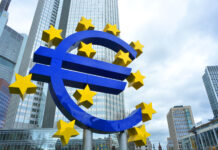
ussia’s invasion of Ukraine is likely to drive inflation in the European Union and the eurozone to new highs. However, this is also accompanied by a growing risk that the European economy will lose its breath. There is therefore speculation that monetary policy tightening should proceed more slowly.
As inflation in the euro area has continued to accelerate in recent months, markets have begun to brace for a tightening of monetary policy by the European Central Bank. The first step in the form of an end to bond purchases was due to come at the ECB’s monetary policy meeting on March 10.
But Reuters has come out with the claim that six sources inside the ECB can imagine even faster action to fight inflation, including raising interest rates as early as this spring. However, there are voices on the other side of the aisle that consider such speculation premature.
Christine Lagarde, President of the European Central Bank, has long been among the advocates of a more moderate approach to inflation. According to the sources cited by Reuters, the key battle on the ECB floor will be over how long the gap should be between the end of bond purchases and the first interest rate hike. The end of quantitative easing, they say, could well come as late as the third quarter.











